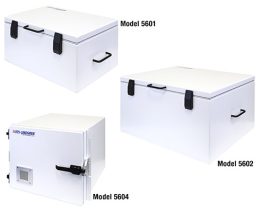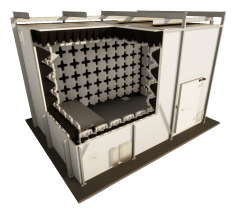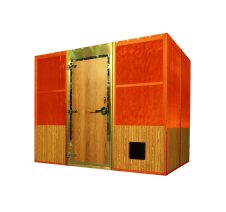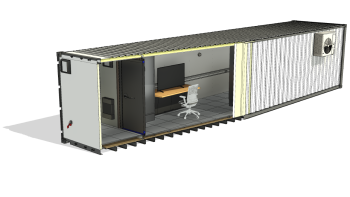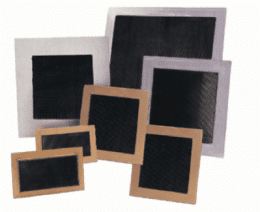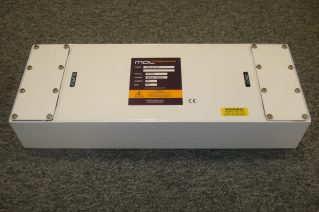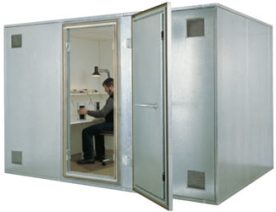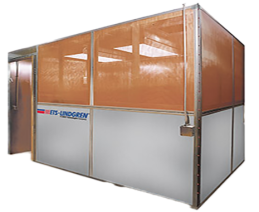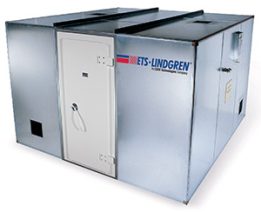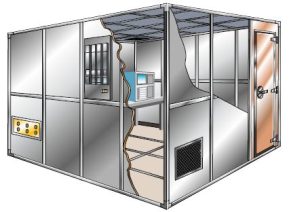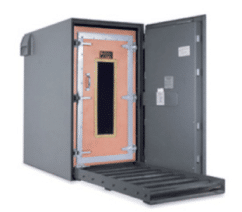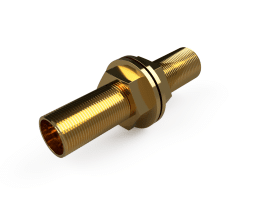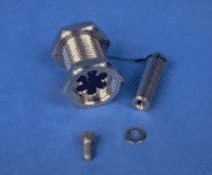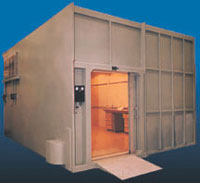Shielding /
RF Shielding
MDL Technologies is part of APC Technology Group. All enquiries for SCIF's, RF Shielded Rooms and EMC Test Chambers are now handled by APC.
Please visit the APC website for more information.
RF shielding refers to the use of materials and structures to prevent or reduce the transmission of electromagnetic radiation in the radio frequency (RF) range. This type of shielding is used in a wide range of applications, from protecting sensitive electronic equipment from interference to reducing the amount of RF radiation that can escape from a device or system.
The basic principle behind RF shielding is to create a barrier that reflects or absorbs RF radiation, preventing it from passing through to the other side. This can be achieved using a range of materials, including metals, conductive polymers, and specially designed composites.
The most common types of RF shielding structures are metal enclosures, which are used to house electronic devices and systems. These enclosures are typically made from materials such as aluminum, copper, or steel, and are designed to provide a continuous conductive barrier around the device or system.
In addition to metal enclosures, RF shielding can also be achieved through the use of conductive coatings or films. These coatings are applied to the surface of a device or system, providing a thin layer of conductive material that reflects or absorbs RF radiation.
One of the key benefits of RF shielding is its ability to protect sensitive electronic equipment from interference. This is particularly important in applications such as medical equipment, telecommunications, and military systems, where even small amounts of interference can have serious consequences.
MDL Technologies is part of APC Technology Group. All enquiries for SCIF’s, RF Shielded Rooms and EMC Test Chambers are now handled by APC. Please visit the APC website for…
...more information.
RF shielding refers to the use of materials and structures to prevent or reduce the transmission of electromagnetic radiation in the radio frequency (RF) range. This type of shielding is used in a wide range of applications, from protecting sensitive electronic equipment from interference to reducing the amount of RF radiation that can escape from a device or system.
The basic principle behind RF shielding is to create a barrier that reflects or absorbs RF radiation, preventing it from passing through to the other side. This can be achieved using a range of materials, including metals, conductive polymers, and specially designed composites.
The most common types of RF shielding structures are metal enclosures, which are used to house electronic devices and systems. These enclosures are typically made from materials such as aluminum, copper, or steel, and are designed to provide a continuous conductive barrier around the device or system.
In addition to metal enclosures, RF shielding can also be achieved through the use of conductive coatings or films. These coatings are applied to the surface of a device or system, providing a thin layer of conductive material that reflects or absorbs RF radiation.
One of the key benefits of RF shielding is its ability to protect sensitive electronic equipment from interference. This is particularly important in applications such as medical equipment, telecommunications, and military systems, where even small amounts of interference can have serious consequences.
-
ETS-Lindgren’s 5600 series of RF Test Enclosures are self-contained, portable test cell enclosures designed for testing wireless devices in a...FIND OUT MORE
-
At MDL Technologies, we have a thorough understanding of the crucial role that an anechoic chamber plays in obtaining precise and dependable test...FIND OUT MORE
-
Standard modular or custom DEI screen industrial shielding enclosures provide the highest shielding performance available in a “hear-through,...FIND OUT MORE
-
MDL Technologies has the capability and experience to provide bespoke deployable RF Shielded Containers to meet the demanding requirements imposed on...FIND OUT MORE
-
Shielding effectiveness and air flow performance are improved with durable waveguide air vents produced by ETS-Lindgren’s exclusive solder...FIND OUT MORE
-
Product Overview The ML600X Series range of High Performance EMI / TEMPEST / RF Power Filters provide a high level of protection for your...FIND OUT MORE
-
The Series 101 RF shielded construction system meets and substantially exceeds all RF shielding requirements. The system consists of modular, hot...FIND OUT MORE
-
The Series 71 Copper Screen Room is designed to provide a radio-silent environment to perform electronic product development and troubleshooting, as...FIND OUT MORE
-
ETS-Lindgren’s Series 81 shielding system is a time-proven design with more than 10,000 installations. The Series 81 Shielded Rooms have...FIND OUT MORE
-
The Series 83 RF Shielding is a fully custom shielding option for specialized applications such as electron microscopes and physiological studies....FIND OUT MORE
-
For high threat, classified applications, the Security Container integrates physical and Tempest security to maintain configuration flexibility...FIND OUT MORE
-
Waveguide feed throughs are available in most sizes for water, gas, or air. Specially designed waveguide feed through assemblies are used for...FIND OUT MORE
-
ETS-Lindgren’s waveguide filters are designed to provide a means of bringing fibre optic cables into a shielded enclosure while maintaining the...FIND OUT MORE
-
Welded fabrication has traditionally been considered by experts the most reliable and highest performing shielding method compared to mechanically...FIND OUT MORE

